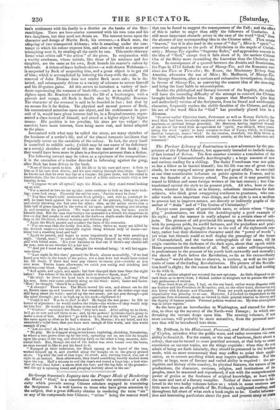The Parlour Library of Instruction is a new adventure by
the pro- prietors of the Parlour Library, but apparently intended to include books of fact instead of fiction. The first number contains a translation of the first volume of Chateaubriand's Autobiography ; a large amount of new and curious reading for a shilling. The flashy Frenchman was not quite so fine a fellow as he fancied himself; but his life was one of great vicis- situde, he was engaged among great men and great affairs, be exercised at one time considerable influence on public opinion in France, and he was the founder of a literary school. The germ of it may possibly be traced in Gibbon and some foreign writers of the last century ; but Cha- teaubriand carried the style to its present pitch. All who, here or else. where, whether in fiction or in history, substitute themselves for their subjects, who think great swaggering conduces to greatness, who con- sider words more important than things, and that stye is not a medium to present but to improve nature, are directly or indirectly pupils of the author of " Atala" and of "The Genius of Christianity."
Except some passages of questionable taste, or others where " brag- ging " predominates, we think the Autobiography a good example of his style ; and the manner is really adapted' to a certain class of sub- jects. The pictures of old provincial life among the Breton aristocracy, with its pompous pride, its sordid fortunes, and the prejudices and prac- tices of the middle ages brought down to the end of the eighteenth cen- tury, rather lose their distinctive character amid the "power of words "; yet what but rhetoric could so well display the genealogy of the house of Chateaubriand, and the various orthographies of the name, till its origin vanishes in the darkness of the dark ages, about that epoch which Hume pronounced the murkiest of all. Self, or rather self-importance, is predominant in the account of his youth both outwardly and mentally; the sketch of Paris before the Revolution, so far as his extraordinary "modesty" would allow him to observe, is curious, as well as the por- traits of some of the leading Revolutionists. His picture of the Revolu- tion itself is slight; for the reason that he saw little of it, and had nothing to do with it.
"I had neither adopted nor rejected the new opinions. As little disposed to at- tack them as to serve them, I wished neither to emigrate nor to pursue the mili- tary profession—I retired. "Thus freed from all ties, I had, on the one hand, rather warm disputes with my brother and the President de Rosambo; and, on the other hand, discussion not less bitter with Dtharpe and Chamfort. From my youth upwards my political impartiality was pleasing to no one. Moreover, I attached no importance to the questions then discussed, except as viewed in their general relation to liberty and the dignity of human nature. Personal politics wearied me. My true atmosphere was in loftier regions."
So the hero got an introduction to Washington and started for Ame- rica, to clear up the mystery of the North-west Passage; in which un- dertaking the curtain drops upon him. The ensuing volumes, if not more curious, will probably be more attractive, from the personal mat- ters that will be introduced into them.


























 Previous page
Previous page